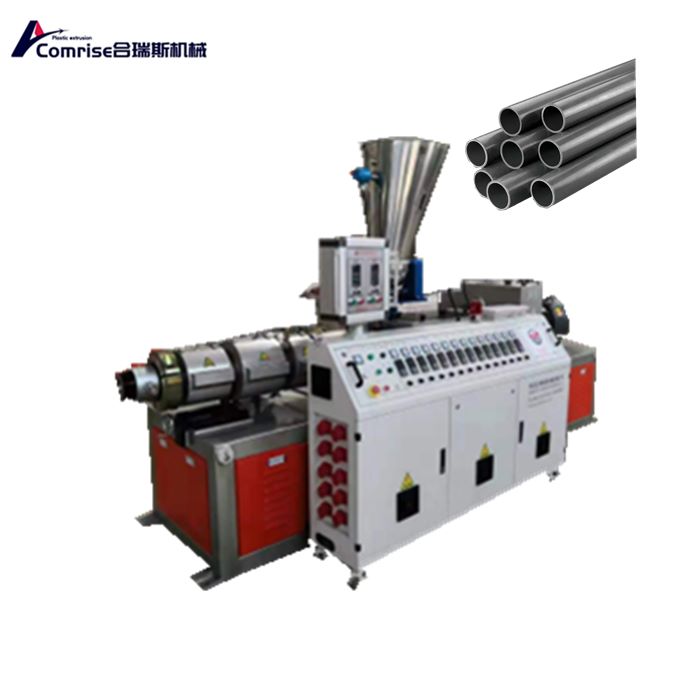Why Are Plastic Pipe Machines Essential for the Modern Manufacturing Industry?
2025-02-21
In the world of modern manufacturing, machinery that can efficiently produce high-quality products is paramount. One such piece of equipment that has become integral to industries worldwide is the plastic pipe machine. These machines are responsible for producing a wide variety of plastic pipes used in everything from plumbing and construction to agriculture and telecommunications. But what makes plastic pipe machines so essential, and how have they transformed industries over the years?
Understanding the Role of Plastic Pipe Machines
Plastic pipe machines are specialized manufacturing equipment designed to extrude plastic materials into durable pipes. These machines use a process known as extrusion, where plastic pellets or granules are melted and forced through a die to form pipes of various sizes and specifications. The end result is a plastic pipe that can be used in countless applications, from water supply systems to electrical conduit and drainage.
The machines can be used with different types of plastic materials, including PVC, HDPE, and PPR, depending on the required properties of the pipe. This versatility allows manufacturers to meet diverse customer needs across different sectors, making plastic pipe machines a crucial part of the supply chain.
Why Are They So Important for Modern Industries?
Plastic pipe machines have significantly impacted the manufacturing industry by providing efficient, cost-effective, and reliable solutions for pipe production. Here are a few reasons why they are so essential:
1. Efficiency and Scalability
Plastic pipe machines are designed for high-speed production, allowing manufacturers to produce large quantities of pipes in a short amount of time. This efficiency is particularly important in industries where demand for pipes is constant and high-volume. With the ability to scale production, these machines enable businesses to meet market needs quickly while keeping costs down.
2. Consistency and Quality Control
In industries where pipe performance is crucial, such as in water systems or telecommunications, the quality of the pipe is paramount. Plastic pipe machines produce pipes with a high level of consistency, ensuring that each product meets the required specifications. With the integration of advanced technology, such as automatic control systems and real-time monitoring, manufacturers can ensure that the pipes are free from defects and meet the highest quality standards.
3. Cost-Effective Production
When compared to traditional metal pipes, plastic pipes offer a more affordable alternative. Plastic pipe machines contribute to this cost-effectiveness by reducing production time, minimizing material waste, and lowering energy consumption. Since the machines can work with lower-cost raw materials, they provide manufacturers with a way to produce high-quality pipes at a fraction of the cost of metal alternatives.
4. Customization and Versatility
Plastic pipe machines are incredibly versatile and can be adapted to produce pipes of various sizes, thicknesses, and lengths. This makes them ideal for a wide range of applications, from residential plumbing to large-scale industrial projects. The ability to customize the pipes based on specific project requirements further enhances their appeal to different industries.
5. Environmentally Friendly Production
With growing concerns over environmental sustainability, plastic pipe machines have evolved to be more eco-friendly. Many modern machines are designed to minimize waste by recycling excess material during the production process. Additionally, plastic pipes, especially those made from recyclable materials like PVC and HDPE, offer an environmentally safer alternative to metal pipes, which can be resource-intensive to manufacture and difficult to recycle.
The Versatility of Plastic Pipes
The versatility of plastic pipes produced by these machines cannot be overstated. Some of the common applications of plastic pipes include:
Water Supply Systems: Plastic pipes are widely used for carrying potable water due to their resistance to corrosion, low weight, and ease of installation.
Drainage and Sewer Systems: Plastic pipes are ideal for sewage and drainage systems because they are resistant to chemicals and can handle a wide range of environmental conditions.
Agriculture: In irrigation systems, plastic pipes offer an efficient, low-maintenance solution for water distribution.
Telecommunications: Plastic pipes are often used for protecting cables in telecommunications, as they are durable, lightweight, and easy to install.
Advancements in Plastic Pipe Machine Technology
As industries continue to demand higher performance and more sustainable production methods, plastic pipe machines have advanced significantly. Modern machines now feature precision control systems, allowing manufacturers to achieve the exact pipe specifications required for a particular application. These advancements not only improve the overall efficiency of the production process but also help reduce operational costs and increase product quality.
Additionally, some machines are now designed to work with recycled plastic materials, promoting a more circular economy and reducing reliance on virgin plastics. This is particularly important in an era where sustainability and eco-consciousness are at the forefront of manufacturing practices.
Conclusion
Plastic pipe machines have become an indispensable tool in the manufacturing world, driving innovation and efficiency in various industries. Their ability to produce high-quality, cost-effective, and versatile pipes has made them crucial for everything from plumbing to agriculture to telecommunications. As technology continues to evolve, these machines will only become more efficient and environmentally friendly, ensuring their place as one of the key components of modern manufacturing.
In short, the question isn't whether plastic pipe machines are essential for the manufacturing industry—they undoubtedly are. The real question is how these machines will continue to innovate and adapt in an ever-changing world to meet the growing demands of both industry and sustainability.



